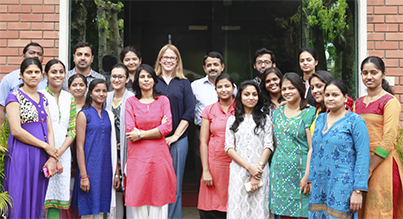India is no exception, but a UMMS researcher has garnered a large grant to expand genetic testing there in a way that improves health for the nation’s 1.3 billion people and doesn’t break the bank for a system struggling to keep up with ever-increasing demand.

“In general there is a push to include individuals from more diverse ancestral backgrounds into genetic studies,” said UMMS Assistant Professor of Human Genetics Stephanie Bielas, PhD. “There is growing evidence that genomic medicine is not being well served by just sequencing people of European ancestry. We’re missing out on a lot of the genetic diversity that helps us more fully understand the human genome.”
In pilot studies with collaborators at India’s Manipal University, Dr. Bielas has shown that large-scale sequencing, deployed effectively, can uncover previously unappreciated genetic information specific to the Indian population. Their findings are changing how genetic testing is performed for some disorders, allowing more individuals to be tested, with higher success, and at lower cost. The NIH just awarded Bielas with a five-year, $2.3 million grant to expand that work.
“The grant gives us the opportunity to address some fundamental and emerging issues associated with expanding genetic testing in India,” said Bielas. “Conversations about national standards and guidelines for genetic testing and return of results to families are needed within the medical genetics community. Identifying implementation strategies that will allow interested parties at other Indian institutions to build on our successes is crucial.”
During their preliminary project, Dr. Bielas and the Manipal University collaborators built the technological and organizational infrastructure needed at to perform sequence-based genetic testing. They identified sequencing partners, developed computational platforms to analyze sequence data, and trained teams to interpret results and return the genetic findings to families.
With that infrastructure in place, the new NIH award will provide advanced genetic testing options to a larger cohort of people. The team is confident that new genes connected with serious neurological disorders will be uncovered. The grant also supports the characterization of genetic variants identified within the larger Indian population and the establishment of an accessible database to share the information with scientists at other institutions in India and beyond.
Dr. Bielas will be in India much of this fall to launch the new project. She has been to India many times in recent years supported by both the initial NIH award and Global REACH. Previously, Dr. Bielas received a Partnership Development Grant in 2016 to expand the whole exome sequencing network beyond Manipal University, to other Indian institutions.
“I credit the support I’ve gotten from Global REACH for the success of this new grant,” she said. “The funding is great, but from a larger perspective it speaks to institutional support. I’ve been able to get letters and point to institutional investment in me and my global health projects. These are the essential details that are attractive to grant reviewers. I appreciate working in an environment where these projects are recognized as valuable and supported through multiple mechanisms.”
